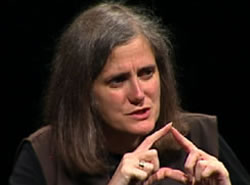GTV Seen Successful in
Showing the “Other” America
By Hazem Kira
 Amy
Goodman
Amy
Goodman |
In a demonstration of its global
reach, GTV has expanded its program series to show its global
audience the seldom seen “other America.” As part
of the emerging global mainstream, GTV and other independent
global media entities are now showing what often the mainstream
or national media doesn’t: a diversity of ideas and
competing interpretations of global events.
“Independent and global media entities”, says
GTV founder Dr. Agha Saeed, “by definition provides
opinions and interpretations different from that of any particular
establishment, in the sense of being independent from a government’s
interests, influence, and control.”
To discuss this issue in greater depth, Dr. Saeed sat down
with Amy Goodman, host and executive producer of one on America’s
most popular American TV programs “Democracy Now!”
Goodman, whose award-winning news program has flourished over
the past couple of years to more than 450 public broadcast
stations in North America, began by defining the role of the
media as “the way we come to understand each other,
[and] the way the rest of the world comes to understand us,"
she said. “Media should be a sanctuary of dissent…it
should be the place to learn the opposing points of views…it
could be a matter of life and death… when the media
acts as a conveyor belt for lies than it unforgivable."
The media must be “a check on power…to be the
fourth estate not for the state.” “Failure of
American media,” continues Goodman, “has reached
an all time low… you have a corporate media that is
beholden to the government and the establishment. What’s
the difference between that media and a state media?”
This leaves a wide space for the independent media and global
media to come in.
Highlighting the importance of the role of the independent
and budding global media, Goodman argued "in order to
be an informed global citizen, people have to be able to dissect
what they're seeing." In her view this is made difficult
by the mainstream media's readiness to be the mouthpiece of
a government, rather than the watchdog. "Unfortunately
in the United States [for instance], the media beats the drums
for war. [And] they iced out dissent," she said.
"I think people are disgusted by what's happening in
this country. [They are] not a silent majority, but a silenced
majority," she said, dismissing the much-touted "myth"
of the media's liberal bias. "The [national mainstream]
media has been serving the state for too long, and that doesn't
serve a democratic society."
Asked about the notions of a liberal wing of the media versus
the conservative wing of the media, Goodman responded, “The
media (today) is expressing the view of the government…and
when they throw out the idea that the media is liberal, it’s
garbage, it’s a smokescreen…the media has been
serving the state for all to long, and that doesn’t
serve a democratic society.”
Goodman also commented on media consolidation and the Telecommunications
Act of 1996. Americans have "hundreds of channels, [with]
few media owners. It matters who owns the media." She
is excited, however, about the Internet's function of becoming
an important outlet for the global media in grassroots journalism.
Elaborating on her concept of “grassroots journalism,
Goodman said, “Well the president occupies the most
powerful position on earth. But there is a force more powerful,
and it is power of people. It is grassroots globalization….
it is us doing journalism at the grassroots level …and
having effect on what I call trickle up journalism…that’s
the force that will make the difference ultimately.”
The role of the global citizen, says Goodman, is “to
be un-embedded in all senses… To provide a forum all-over
(for people) to speak for themselves.”
"What's essential is that we have conversations across
borders, across generations… across racial barriers
and religious barriers," She told Dr. Saeed.
Today’s journalism schools must be there to “challenge
the state. Holding those in power accountable…we should
be “watchdogging” them.”
On Oct 6, GTV will interview famous author Michael Parenti,
author of many books including “Democracy for a Few”.
On the same, GTV will also interview Dr. Baljeet Kaur, a research
scientist specializing in cancer.
GTV is also currently working on a documentary about the life
and times of late Dr. M. T. Mahdi — a pioneer in American
Muslim political participation and institution building.
-------------------------------------------------------------------------------------

